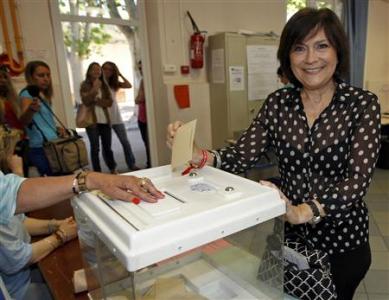(Reuters) – France began voting in a parliamentary run-off on Sunday expected to hand President Francois Hollande’s Socialist party a majority and bolster his position in legislative battles over euro zone crisis policy.

A clear majority reliant neither on opposition conservatives nor eurosceptic hard leftists, as opinion polls suggest, would be a boon as Hollande prepares legislation to raise taxes, adjust budget spending and ratify an EU fiscal discipline pact.
Yet with a simultaneous election in Greece threatening to tip Europe into chaos and French voters in no mood for further economic gloom, Hollande will have no time to bask in glory.
Opinion polls and projections from last Sunday’s first-round vote suggest the Socialist bloc could achieve the 289 seats needed for a majority in the 577-member National Assembly even without adding seats from its Green Party allies.
Added to its control of the Senate and the presidency, that would give the Socialist Party more power than it has ever held and should leave Hollande’s largely social democratic and pro-Europe cabinet broadly intact.
The possible entry of Marine Le Pen’s far-right National Front into parliament for the first time since the mid-1980s with up to three seats would be uncomfortable but would not pose any threat to Hollande’s power to govern.
“It would probably be better if the Socialists get an absolute majority because they won’t be influenced by the far left and they’ll be able to govern along more centrist lines,” said Yves Collignon, 62, a retired engineer voting in Paris.
Hollande, who won power last month, will fly to Mexico early on Monday with voting slips barely counted for the first of a flurry of summits. His decision to side with southern nations weary of austerity has opened a rift with Europe’s paymaster Germany that the Socialist needs to fix fast.
He is toning down calls for joint euro zone bonds – accepting Berlin’s insistence this is a long-term prospect – and is instead pushing for a package of growth-boosting measures worth around 120 billion euros.
Hollande may face a challenge keeping eurosceptic Socialist lawmakers behind him if he agrees to Germany’s demand for a commitment to deeper fiscal and political integration in Europe.
He may also encounter resistance to slowing down spending plans if a public finance audit due by end-June shows France ill placed to meet its deficit goals, as it is expected to do.
“Hollande’s biggest political test will be to keep his party united if he is forced to adopt economic policies that are unpopular with the electorate,” political analyst Antonio Barroso of Eurasia Group said in a note to clients.
NO VOTER HONEYMOON
Polling booths opened at 8 a.m. (02.00 a.m. EDT) and the last ones were due to close 12 hours later, with concern over turnout as voters go to the polls for the fourth time in eight weeks. The abstention rate hit a record of nearly 43 percent last Sunday.
Initial results will be released at 8 p.m., the same time the world will learn whether Greece has elected an anti-austerity party whose victory could undermine its euro zone membership and send shockwaves through financial markets.
Hollande’s chief ministers, including Prime Minister Jean-Marc Ayrault, were elected in round one by scoring more than 50 percent of votes. Those in run-off contests, like Finance Minister Pierre Moscovici, are expected to win their seats.
In all, 36 deputies were elected outright last weekend and 541 constituencies are up for grabs on Sunday.
A survey by Ipsos-Logica Business Consulting published on Friday, and tallying with other polls, showed Hollande’s Socialist bloc could win between 284 and 313 deputies and that the Greens could take 14 to 20 seats.
The radical Left Front coalition, whose leader Jean-Luc Melenchon was knocked out of the running for a seat representing an economically destitute northern town by Le Pen last week, is set to win just 12 to 13 seats.
Le Pen’s National Front is looking at up to three seats, and the conservatives, fractured since their leader Nicolas Sarkozy was ousted as president in May, are set for 192 to 226 seats.
The projections are for a bigger parliament win for the left than in the 1997 election, when voters lashed out at the then conservative government’s attempt at welfare reform, and in 1988, just after President Francois Mitterrand’s re-election.
That would still leave Hollande short of the two-thirds majority he would need for any constitutional changes, such as legislation to give EU institutions more power over the budget.
Hollande faces the risk that opposition lawmakers could demand a referendum in exchange for supporting legislation that many voters would view as undermining French sovereignty.
The fact voters are already marking Hollande harshly suggests they will react angrily if he announces spending cuts.
“My hypothesis is that after the summer there will be social upheaval as people will no longer be able to voice frustration via the ballot box,” political expert Dominique Reynie said.
(Additional reporting by Nicholas Vinocur; Editing by Angus MacSwan)





